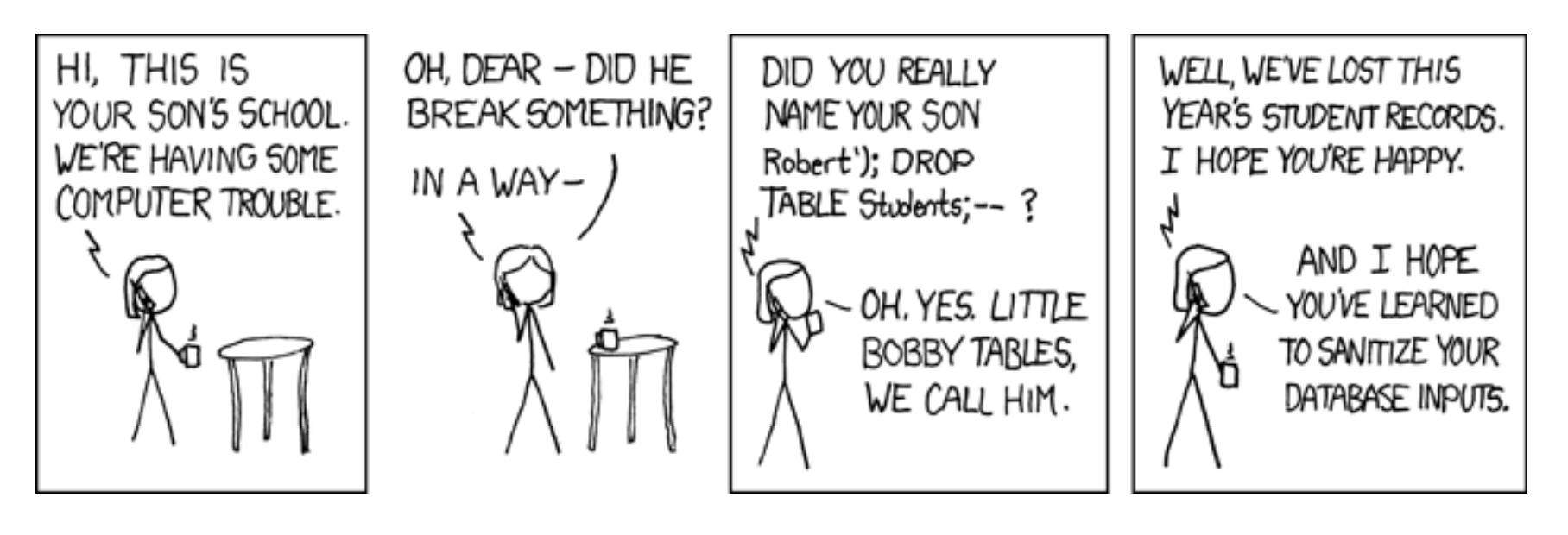- Return to book
- Review this book
- About the author
- Introduction
- 1. Access Control
- 2. Authentication
- 3. Biometrics
- 4. Crypto Engineering
- 5. Malware
- 6. Protecting Clients
- 7. Security and Usability
- 8. Secure Programming
- 9. Physical Security
- 10. (Web Service) Architecture
- 11. Confinements
- 12. Program Structure
- 13. Security Analysis
- 14. The Internet of Things
- 15. Logging
- 16. After An Attack
- 17. System Structure
- 18. Exams
secure-sensitive program
Program that runs with one set of permissions and accepts input from somone with different (especially lesser) permissions
SQL injection
- If you invoke an external program, be aware of its parsing rules (language semantics).
- Especially serious for languages like Shell, Perl, and Python, where data can be converted to statements and executed.

Internal Field Separator (IFS)
For many command line interpreters (“shell”) of Unix operating systems, the internal field separator (abbreviated IFS) refers to a variable which defines the character or characters used to separate a pattern into tokens for some operations.
- The shell variable IFS lists the delimiters used when parsing command lines.
- If you can change it, you can control the shell’s parsing.
Environment variables
PATH- If “.” is first,, you’ll execute a command in the current directory. What if it’s booby-trapped?
ENV: a file to execute on startupLD_LIBRARY_PATH: The search path for shared librariesLD_PRELOAD: Extra modules loaded at runtime
File Descriptors
- 0 stdin, 1 stdout, 2 stderr
open()system call allocates thefirst available file descriptor, starting from 0.Suppose you close fd 1, then invoke a setUID program that will open some sensitive file for output.
Anything it prints to
stdoutwill overwrite that file.Similar tricks for
fd0.
Filename Parsing difficult to get all of them right.
- Wildcard matching is enabled..
- To open a private file:
Method 1: client opens the file and passes the open file descriptorMethod 2: client sends access right the severA file descriptor is a form of capability, but can't be used over a network.
The ".." problem
http://example.com/../../../etc/passwd- The ".." can occur later:
http://example.com/a/b/../../etc/passwd
Unicode
- Standard for representing (virtually) all of the world’s scripts.
- Problem: Some symbols look the same, but have different values: ordinary /—technically called “solidus”—is U+002F, but U+2044, “fraction slash”, looks the same.
Temporary File
- Temp files are subject to race-condition vulnerability
mktemp()is vulnerable to race-condition- Alternatives:
mkstemp()ormktemp()with theO CREAT | O EXCLflags to open()
Shedding SetUID
BAD: A setUID program can give up and then regain its setUID status:save_uid = geteuid(); seteuid(getuid()); fd = open(file, O_RDONLY); seteuid(save_uid);GOOD: run unprivileged most of the time, but assume setUID status only when doing privileged operations